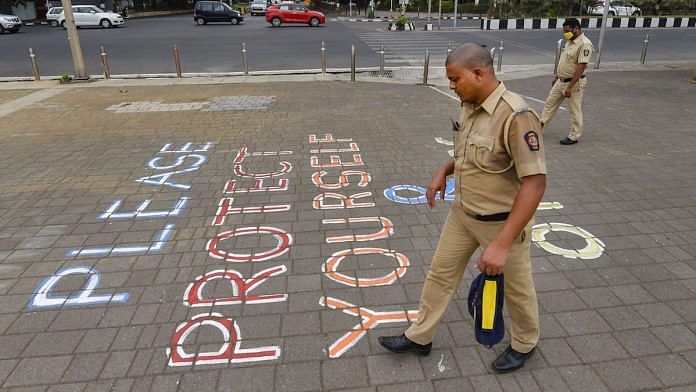As India begins to exit the strict coronavirus lockdown and partially unlock social and business activities, one of the trickiest tasks perhaps will be the role of police forces that will have to outgrow their traditional role as the feared enforcers of the law and function as service providers. The increasing pressure of performing these duties has revealed how overburdened and ill-equipped the police are — and how costly the failure to implement long-overdue police reforms has been.
Since the coronavirus pandemic hit India and Prime Minister Narendra Modi announced the first phase of lockdown in March, police have helped displaced migrants, protected healthcare workers and overseen the seamless movement of transport and logistics for essentials. These duties will continue for a while and will get even more challenging as the country starts moving again. There were also incidents of the police beating jobless workers and their families as they walked home. Contrasting these, there were videos of police feeding workers, and in a few cases celebrating birthdays of the elderly living alone in the lockdown.
But for the police to get things right, it is important that policymakers start looking at two important areas of structural change — police-public relations and inter-agency coordination. This fundamental re-imagining of a colonial-era police mentality will require tremendous political will and a renewed focus on reforms.
Previous commissions such as the National Police Commission (1977-1981) and the Second Administrative Reforms Commission (2005-2009) have already recommended these reforms. The second report of the National Police Commission in 1980 advised that “the police should duly recognise, and be trained and equipped to perform the service-oriented role in providing relief to people in distress situations”. The National Disaster Management Policy 2009, describes police as the “first and key responders” in a disaster. One of the main reasons is how conversant the police are with dynamics in their area. At the interface between the State and society, the police are deeply entrenched and bring key insights into the everyday lives of the people.
Also read: Frontline duty, limited PPE, ‘low immunity’ — why Mumbai Police has been hit badly by Covid
Community policing
A community’s cooperation is rooted in strong police-public relations. One way to boost this relationship and realign it with police ‘service’ is through community policing. The Covid-19 crisis has brought this to the forefront. Take, for example, the Janamaithri Suraksha Project in Kerala. Launched by the state government in March 2008, this initiative aimed at changing the relationship between the police and the public. With the outbreak of the coronavirus in Kerala, the Janamaithri police were brought in to monitor those who were quarantined. They have been instrumental in contact tracing, reaching out to the elderly and creating health and hygiene awareness among families and labourers through home visits and classes conducted with the help of private hospitals and establishments.
Considering how overstretched our frontline police officers are, coupled with the high risk of contracting the virus, community mobilisation is more sustainable than a penal approach. Dr K. Viswanath, of the Harvard T. H. Chan School of Public Health, as a part of a webinar on Behaviour Change Post Lockdown, organised in collaboration with Centre for Social and Behaviour Change, stressed the importance of people co-designing and being an active part of solutions during this pandemic. Community policing helps make the people who know the problem best be a part of the solution.
It also shifts responsibility to the individual, which is often more effective than government action. An active voice of the community, for instance, can help shift social norms and narratives around the coronavirus. This, in turn, can reduce the reliance on enforcement by the police, who have their hands full of competing priorities that need attention.
Of course, for community policing to work, our police will have to be trained very differently. Training programmes now emphasise a command and control approach rather than the service-oriented training that enables community policing. A complete restructuring of the policing ethos and training in India will not be easy or quick — but it is essential.
Also read: Police celebrating birthdays of rich kids in a pandemic isn’t cute, they have bigger duties
Inter-agency coordination
The police also need administrative support to be effective. The third report on crisis management by the Second Administrative Reforms Commission highlighted the need for inter-agency coordination, especially in urban areas with a commissionerate system. As more and more urban centres record an increase in the number of Covid-19 cases, this is more relevant than ever before. The report recommends that all major service providers, including departments like engineering, public health, revenue and fire services should be represented in a coordination committee, set up under a mayor, assisted by the Commissioner of Police and the Municipal Commissioner.
The Police Act Drafting Committee, part of the Model Bill (2005), had also recommended this: “In order to ensure proper liaison, consultation and coordination between the police, the municipal authorities, the district administration and such other departments of the government, whose functioning impacts the working of the police, the State Government by notification, will constitute appropriate coordination machinery and lay down procedures.” The current health crisis has shown us just how badly such machinery is needed.
This crisis provides a window of opportunity to push for long-pending police reforms that address the traditional approach of coercion, and outdated training programmes that emphasise aggression and suppression. The once colonial-era blunt force instrument needs to be transformed into a sophisticated, adaptable civilian organisation.
Avanti Durani is an Assistant Director and Junior Fellow and Priya Vedavalli is an Associate at IDFC Institute, a Mumbai-based think tank. Views are personal.



